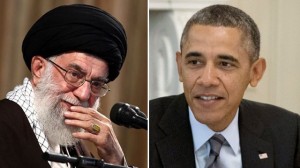by Alan M. Dershowitz • USAToday
 The Framers of our constitution probably would have regarded the nuclear deal with Iran as a “treaty,” subject to a two thirds ratification by the Senate. At the very least they would have required Congress to approve the agreement by a majority vote. It is unlikely that it would have allowed the President alone to make so important and enduring an international agreement.
The Framers of our constitution probably would have regarded the nuclear deal with Iran as a “treaty,” subject to a two thirds ratification by the Senate. At the very least they would have required Congress to approve the agreement by a majority vote. It is unlikely that it would have allowed the President alone to make so important and enduring an international agreement.
If President Obama doesn’t treat the Iran agreement with more respect, all his arguments today are beside the point. The agreement won’t have the force of law.
Article II, section two of the Constitution states that the president “shall have the power, by and with the advice and consent of the senate, to make treaties, provided two thirds of the senators present concur…” Although the Constitution did not provide a clear description of the types of international agreements the Framers viewed as “treaties,” there is evidence that they included significant and long-term commitments with foreign countries. Some early versions of the Constitution allocated treaty-making powers solely to the Senate, but Alexander Hamilton argued that “joint possession of the power in question, by the President and Senate, would afford greater prospect of security, than the separate possession of that by either of them.” He thought it unwise to give a single person all the power to shape the country’s relationship to the rest of the world. He believed that the public is much better protected from abuse under the Constitution than it was under the Articles of Confederation, which rested the power solely in the hands of Congress.
In Federalist Paper 69, Hamilton specifically contrasted the treaty-making power of the British sovereign, with the Constitution that afforded the executive treaty making authority only with the advice and consent of the Senate.
When the Constitution was adopted, the leading authority in the world on such issues was Emerich de Vattel who was the author of the most influential treatise on international law. Benjamin Franklin noted that his treatise was “continually in the hands of the members of our congress now sitting.” Vattel defined a treaty as an agreement made “for perpetuity or for a considerable period of time” as distinguished from “having temporary matters for their object.”
In the two and a quarter centuries since the ratification of the Constitution, the power of the executive has expanded considerably, but the Framers would be shocked by the current situation in which the president alone gets to make an important and enduring international agreement that can be overridden only by two thirds plus one of both the senate and the house. At the very least, this important and enduring deal should have required a majority vote of Congress. Although the Constitution does not provide for such a hybrid agreement, in practice there have been numerous “executive-congressional” agreements that have been negotiated by the president and agreed to by a majority vote of Congress. Basic principles of democracy as well as our constitutional system of checks and balances would seem to require more than a presidential decision supported by one third of both the house and senate.
While a majority of the House and the Senate voted for this exceptional set of rules for approving the Iran agreement, it was only to assure themselves that they would have any say at all in the matter. President Obama’s position was that he could make the “executive” agreement without Congressional approval.
The Supreme Court has rarely spoken on the distinction between treaties and other forms of agreement, but when it has, it has raised serious questions about the president’s power to enter into long-term deals with foreign powers without the consent of Congress. Here is what it said in Gibbons v. Ogden, “[G]eneral and permanent commercial regulations with foreign powers must be made by treaty, but … the particular and temporary regulations of commerce may be made by an agreement of a state with another, or with a foreign power, by the consent of Congress.” Although the Gibbons case dealt with the relationship between the federal government and the States, its language suggests that the president alone may not have the power to avoid congressional oversight by simply declaring an important deal with foreign powers to be an executive agreement rather than a treaty.
With regard to the deal with Iran, the stakes are so high, and the deal so central to the continuing security of the free world, that it should — as a matter of democratic governance — require more than a presidential agreement and one third plus one of both houses of Congress. This is especially true where there is no clear consensus in favor of the deal among the American people. Though we do not govern by polls, it seems fairly clear that a majority of Americans now oppose the deal.
Let us never forget that America is a democracy where the people ultimately rule, and if the majority of Americans continue to oppose the deal, it will ultimately be rejected, if not by this administration, than by the next. An agreement, as distinguished from a treaty does not have the force of law. It can simply be abrogated by any future president. In the end, the court of public opinion decides important policy decisions that may affect us all. And it is difficult to imagine a decision with higher stakes than whether to accept or reject this deal.
Alan Dershowitz is an emeritus professor of law at Harvard Law School.